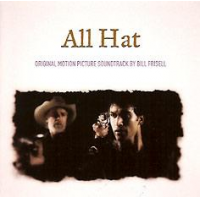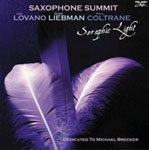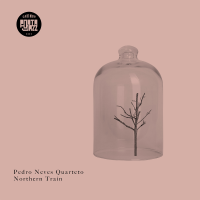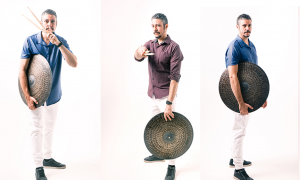Home » Jazz Articles » Interview » Dino and Jose Saluzzi: Family Guys
Dino and Jose Saluzzi: Family Guys
I think that identity has a grave problem today, because the influence of information is destroying it.
—Dino Saluzzi
 "Remove the records from Texas, and someone will learn to sing," the composer John Cage once said. The life of Argentine bandoneonist/composer Dino Saluzzi lends weight to Cage's words. Saluzzi was born in 1935 in Campo Santo, a small city in the mountainous Argentine province of Salta, and learned music in the context of daily life without access to radio, recordings, or formal concerts. Even as Saluzzi moved to Buenos Aires, befriended Astor Piazzolla, composed symphonic works, and became an internationally known artist for his unique blend of jazz, tango, folkloric, and classical music, he remained a steadfast believer in the value of the oral tradition and the primacy of collaboration.
"Remove the records from Texas, and someone will learn to sing," the composer John Cage once said. The life of Argentine bandoneonist/composer Dino Saluzzi lends weight to Cage's words. Saluzzi was born in 1935 in Campo Santo, a small city in the mountainous Argentine province of Salta, and learned music in the context of daily life without access to radio, recordings, or formal concerts. Even as Saluzzi moved to Buenos Aires, befriended Astor Piazzolla, composed symphonic works, and became an internationally known artist for his unique blend of jazz, tango, folkloric, and classical music, he remained a steadfast believer in the value of the oral tradition and the primacy of collaboration.
Dino's son, Jose, began playing with his father when he was only 15, and has since staked out his own path as one of the leading guitarists in Argentina. Jose grew up in Argentina and Europe, spending his formative years studying with leading players like Walter Malosetti, Ralph Towner, and Stanley Jordan. Despite having an upbringing very different from his father's, Jose shares his father's restless curiosity, soulfulness, and skepticism towards the academic establishment.
The center of musical life for both Saluzzis is The Saluzzi Family Band which, aside from Dino and Jose, features Dino's brother Felix on sax, Dino's nephew Matias on bass, and "adopted" family member, U.T. Gandhi on drums. The Family Band has released two albums on ECM—Juan Condori (2006) and Mojotoro (1992)—and is currently working on two more that the Saluzzis hope to record before a 2008 summer tour of Europe.
Oral Transmission and the Academy
All About Jazz: Dino, I've read that when you were growing up in Salta there were no recordings in your house, and that music was just part of daily life. What was it like to learn music in that context?
Dino Saluzzi: In reality, the music was a virgin music that wasn't edited, that was never written down, that was passed down orally. My father worked on a sugar plantation, and, in his free time, he played the bandoneon and studied lead sheets of tango and folkloric music. There weren't books, or schools, or radio—nothing. When I began to study music and I learned more, advanced more and went further, [my background] gave me a certain kind of freedom; because when you're in the academy it's much more rigid, more organized, more systematized.
AAJ: So, you were able to craft a personal style more easily?
 DS: Yes. [In the music I grew up with] there was a kind of virginity in the way we felt and perceived it. It wasn't weighted with influences at all. Of course, the music wasn't very complicated. Since we didn't get any information through the radio or through albums, there wasn't any knowledge of academic music, or of symphonic music, or formal concerts. What happened was, regardless of the absence of every kind of information, my father was able to transmit a musical education to me; music that, later, when I was studying, I realized that I already knew—not from the point of view of reason or rationality, but rather in a different way, a strange way, the way that is produced by oral transmission.
DS: Yes. [In the music I grew up with] there was a kind of virginity in the way we felt and perceived it. It wasn't weighted with influences at all. Of course, the music wasn't very complicated. Since we didn't get any information through the radio or through albums, there wasn't any knowledge of academic music, or of symphonic music, or formal concerts. What happened was, regardless of the absence of every kind of information, my father was able to transmit a musical education to me; music that, later, when I was studying, I realized that I already knew—not from the point of view of reason or rationality, but rather in a different way, a strange way, the way that is produced by oral transmission.
AAJ: And Jose, you had a musical education that was quite different, but also inside the context of the family. What was it like?
Jose Saluzzi: [It was] also through oral transmission—a game, it was like a game. But, it seems to me that what defines my generation is, in reality, our access to information. Our generation comes with an overload of information.
DS: It's occurred to me that what is called personality or originality derives from the reconstruction of learning. [This way of learning] comes from a certain way of understanding, and a certain way of living together in the family. Jose collaborates with me to reconstruct [what I taught him]; I find myself reconstructing what my father taught me. Oral transmission disseminates things in a complex and disorganized way, but at the same time, it's very enriching because it leaves the door open for you. You have to imagine a solution.
It's as if you were writing a symphony. Generally, people that study instrumentation and orchestration have to imagine the work, because they can't check their ideas with a symphonic orchestra as they're writing. You imagine things that later become an approximate reality until you learn more, until you gain more familiarity with things through experience. I think there should be a kind of exchange [in music]. Oral transmission gives rise to the exchange of ideas that develops between the narrator and the listener, and the listener and the narrator. It's fantastic.
AAJ: Does this kind of exchange exist in all music?
DS: Pierre Boulez said that he thought that you become a musician by listening to everything. You listen, you codify, you reconstruct. That's usually what happens with oral transmission. In the academy, or wherever everything is codified, you go through music in a very specific order: first you study harmony; then you study one note against another; then two notes against two notes; then three—you get it.
Our case was totally atypical. We would take things from a certain moment, and we'd ask about them. From that, we'd have the subject for a discussion—not a class, a discussion. That would happen for harmony, and counterpoint, and form, and orchestration, and instrumentation. Not, 'first this, then this, then that,' like you get within the system. [Oral transmission] is a kind of disorder, which, you could say, is appropriate to life.
 AAJ: So you learn through curiosity?
AAJ: So you learn through curiosity?
DS: Exactly.
JS: You end up learning more that way. At least that's my experience, and what I've heard other people say.
DS: Now, oral transmission has to find a way to incorporate the more formal areas of learning as well. Oral transmission can become limiting if you don't continue [studying] the history of music in books or the work of great composers. [Only studying those things] could be a way of saving time, because it's already been written down, and in the end, it's necessary to apply your own opinion with respect to what's happening in the music.
JS: If you don't, what you end up with is a copy.
DS: Certainly. If you wanted to write a variation, for example, you need to apply your own convictions with respect to that variation. If not, then studying music is like inserting a card [Dino inserts the imaginary information card into his forehead].
There's one thing that's very important to remember: every student has a different personality. Every student is a person, he's an individual; and while he may work in a way that's similar to others, one is never another. It's like in school. There are 15 or so students that come together in the same class, the knowledge that you're trying to pass along suffers a certain kind of deterioration, because it's not personal.
JS: At the same time, what needs to be made clear is that music academies aren't what they were fifty years ago. Now, everything is very globalized.
DS: Certainly. But remember, Stravinsky studied with Rimsky-Korsakov, and he studied face-to-face. It was student and teacher sitting down at a table and talking.
AAJ: Is that kind of face-to-face teaching the same as the oral tradition?
DS: It's more or less the same. The only thing is that Rimsky-Korsakov discovered a system, and that gave him the status he has today. Yes, it's oral transmission—a discussion about things...that are sometimes much more involved than what you'd learn about simply with technical information. Music involves feelings and the heart, not just reason.
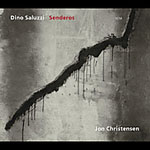
It's also linked to vital work in all fields. A mathematician forcefully manipulates musical elements, because music is also a mathematical exercise. A lawyer also needs to use a musical system, because he has a consciousness of perspective, and an orchestra, a musical composition, also helps with a notion of perspective in order to balance a work, in order for it not to be too loud or too soft, and to ensure that everyone isn't playing at the same time. There has to be a certain perspective, because if not, it won't mesh.
AAJ: So then does a musician also practice mathematics and law?
DS: The real law! Because a voice in a fugue with four voices, that voice has a certain right without which there is nothing...without the law you can't do anything. That's something they don't tell you in school.
class="f-right">
AAJ: Speaking of a subject related to this one, how do you compose? What kinds of things are you thinking about when you're composing?
DS: Always images—images, stories, lived moments. Creation is a mystery. You also can't forget that we live in an energetic world, that we also receive energetic influences.
AAJ: Do these images and stories arise during the composing process?
DS: In order to compose a fugue, first you have to have the subject. The subject shapes the form of everything that comes afterward—the subject shines through in every part of the piece. In free composition—which is more interesting from all points of view—the imagination goes farther. Sometimes you need a plan, although that depends on the size of the work.
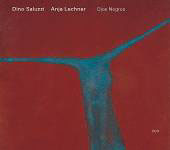 If it's a small work, you can perceive it in the same way that you do the things that are on this table. For example, there's a glass, here's a telephone [Dino motions at the objects on the table]. Now, if this table where multiplied by five, you'd have to draw out plans in order to be able to have a certain sensation of the balance and the form that will structure the whole. This is a place where [a pre-determined compositional structure] helps you.
If it's a small work, you can perceive it in the same way that you do the things that are on this table. For example, there's a glass, here's a telephone [Dino motions at the objects on the table]. Now, if this table where multiplied by five, you'd have to draw out plans in order to be able to have a certain sensation of the balance and the form that will structure the whole. This is a place where [a pre-determined compositional structure] helps you.
AAJ: And Jose, do you have the same experience with composing?
JS: No, because I have less experience. You don't always compose from knowledge, you compose from experience as well, and that's the beauty of learning from someone. That's what you can't learn in a school, unless...Stravinsky were giving classes—or Bartok. When Bartok was in the US, he gave composition classes; Schoenberg as well.
AAJ: When you compose, do you think of the specific musicians who will be playing the music?
DS: When we're rehearsing, we compose in the moment. Let's say I come into the rehearsal with an idea. We try to make it so that everything isn't subordinated to that one idea, that there are points of view and opinions that converge in the development of the idea. Sometimes we change things around during the rehearsal; we change in search of [a new idea]. Even if it's been done by someone else in another way, it's new for us because we're applying it in a different way and in a different context.
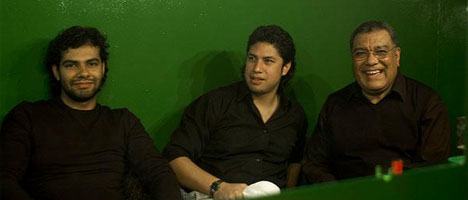
Because of that, I get bored when everything comes directly from my head. I don't have surprises for myself; I like it better when someone surprises me with [his own idea]. Once again, it's all about reconstruction. [Reconstruction] seems to me to be of fundamental importance to the music.
class="f-right">
Improvisation and Reconstruction
AAJ: And do your improvisations also have this ethic of reconstruction?
DS: Yes. We don't improvise only over the scales. Generally, we improvise in a particular way over the harmony and the melody. We don't improvise far away from the work, far from the piece or the passage. We play things that later appear improvised, but have a lot to do with the original melody. It's almost a deformation of the melody that appears as an improvisation because there is, as we would say, a reconstruction.
AAJ: And Jose, do you play in a similar way, or in a more traditional style of jazz improvisation?
 JS: [Traditional jazz improvisations] are more harmonically based. What I do isn't the kind of typical jazz improvisation, it's more repetitive, it's more relative [to the melody].
JS: [Traditional jazz improvisations] are more harmonically based. What I do isn't the kind of typical jazz improvisation, it's more repetitive, it's more relative [to the melody].
I think that all music is improvisation, because all music has to do with creation. Listen, in academic music, you have real time and predetermined time. The difference between composition and improvisation is nothing more than that [composition] is a process or a filter, and that real improvisation has no filters. I think that this kind of thing exists in all kinds of music...
AAJ: Then Jose, when you say that all music is improvisation...
JS: I take it as a perception or a view. Improvisation is a perception; it's not a form through which you dump out everything.
DS: Because of that, we think that, as important as recordings are, they are attacks against creativity, against the surprise of the moment. When you're recording, the work is already dead. It'll be reborn when the person who recorded it plays it again live.
Recordings serve as a deposit of information, but in reality they are an attack against creativity. Music never happens in the same way as on a recording. Real music, music that naturally sounds from the instruments to the public, or whoever is listening, always enjoys a certain renovation.
AAJ: A month ago, I spoke with [Argentine guitarist] Quique Sinesi, and he said something that I thought was beautiful, that everyone is searching for something farther than the note. Is that true in your case?
DS: It's a way of searching inside yourself. I don't think that anyone makes music with the intention of demonstrating that he's the best. He does it because there's something inside of him that comes to the surface as a necessity. The same is true of Schoenberg's piece, "Transfigured Night." His intention wasn't to write something very complicated. There was something inside of him that surged forth in a certain way, a certain natural way.
AAJ: So, when you play music that has roots in jazz, tango, folkloric music, classic music, etc, it's something that arises during the process. It's not to demonstrate...
 Both Saluzzis: No, no, no!
Both Saluzzis: No, no, no!
JS: It's the result of a musical idea.
AAJ: And that's part of your identities?
DS: Certainly. It says that today there can still be an identity. I think that identity has a grave problem today, because the influence of information is destroying it. If one thing is certain for me, it's that music is implicit in all people. It's lying buried in all people. It's just that musicians are those that take it outside, because they know a way to give it body and form.
JS: If not, how would you explain why people get emotional when they listen to something?
DS: It's lying buried in all people. It has a region. If you're authentic and open to receiving influences from your surroundings, surely you'll express your surroundings. It doesn't have borders, because in that way of expressing things there can be an entire universe that still isn't known.
AAJ: So more than genres of music...
DS: Genres of humanity! Or maybe, genres of the individual. Why is something jazz music? [Take the case of Coltrane.] That's not jazz music, it's the music of Coltrane—he made it. Why ignore the individual?
When you're studying, you get a lot out of achieving personal freedom; it gives you your own thoughts. Not because you have something that's yours, but because it enriches everything that surrounds you. Not in order to feel that it's yours, but to enrich the context with the addition of a newly reconstructed piece. I'm enamored with the word "reconstruction" because that's how everything works.
Selected Discography
Dino Saluzzi and Anja Lechner, Ojos Negros (ECM, 2007)
Dino Saluzzi Group, Juan Condori (ECM, 2006)
Dino Saluzzi, Senderos (ECM, 2005)
Dino Saluzzi Trio, Responsorium (ECM, 2005)
Tomasz Stanko, From the Green Hill (ECM, 2000)
Dino Saluzzi Group, Mojotoro (ECM, 1991)
Dino Saluzzi, Andina (ECM, 1988)
Enrico Rava/Dino Saluzzi Quintet, Volver (ECM, 1986)
Dino Saluzzi, Kultrum (ECM, 1982)
Photo Credit
Juan Hitters
Antonio Baiano (wide photo of trio)
Tags
PREVIOUS / NEXT
Support All About Jazz
 All About Jazz has been a pillar of jazz since 1995, championing it as an art form and, more importantly, supporting the musicians who make it. Our enduring commitment has made "AAJ" one of the most culturally important websites of its kind, read by hundreds of thousands of fans, musicians and industry figures every month.
All About Jazz has been a pillar of jazz since 1995, championing it as an art form and, more importantly, supporting the musicians who make it. Our enduring commitment has made "AAJ" one of the most culturally important websites of its kind, read by hundreds of thousands of fans, musicians and industry figures every month.



